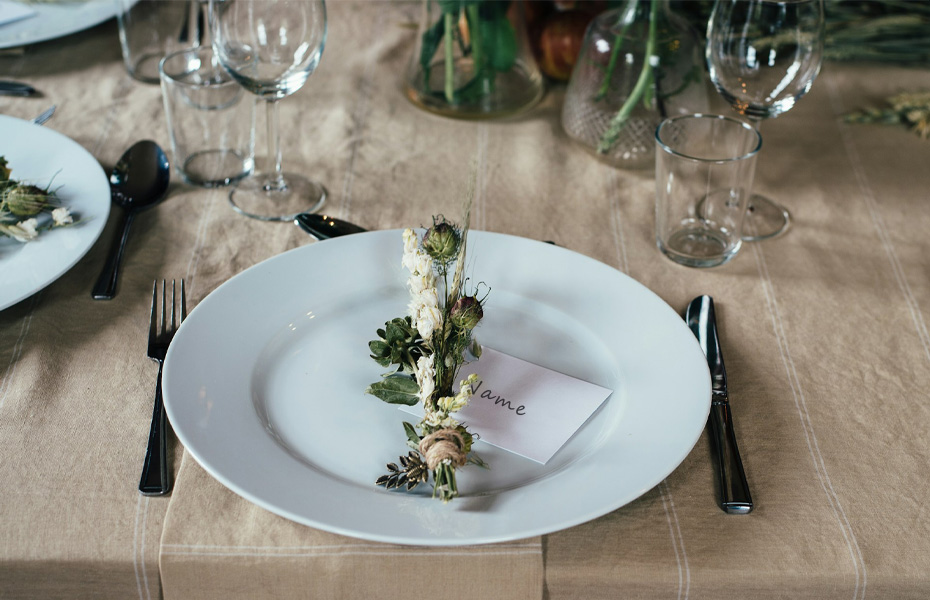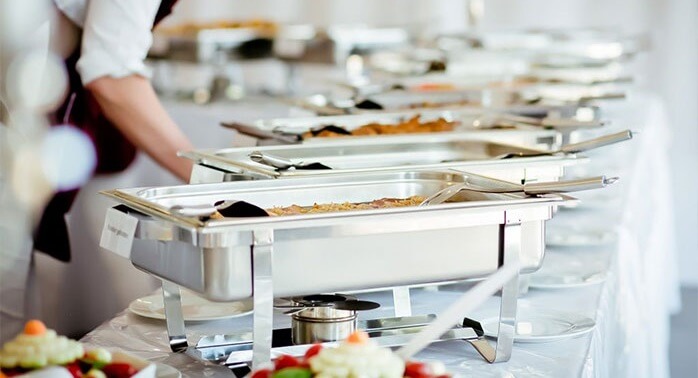Wedding Planning: How to Cater for Guests with Specific Dietary Requirements
Last updated: August 27th, 2024 Published on: March 10, 2019With so many people having different dietary requirements, it’s getting harder to cater at weddings. But, it’s not impossible, simply follow these simple steps to take the stress out of preparing for the catering on your big day.

Ask Your Guests in RSVP Cards
Firstly, you need to find out what dietary requirements your guests actually have before making arrangements with the caterers. There’s no point arranging a shellfish-free option if none of your guests are allergic to shellfish. The easiest way to do this is ask what dietary requirements people have on your RSVP cards. This means that guests can simply note down any requirements (e.g. vegan) and mail it back to you. It is much more stress-free than guests informing you a couple of weeks before the wedding day!
Label Your Place Cards (V) or (GF)
When organising your table plan, it’s best to note where the guests with specific diets are going to be sat. That way, you can tell caterers first hand, and be sure these guests are getting the correct food. Labelling table place cards with your guests’ specific requirements will also help caterers (e.g. labelling vegetarian guests with (V) and gluten-free guests with (GF). If you are also planning on printing your wedding menu on your place cards or putting menus on the tables, remember to print the specific menu for people with different dietary requirements.
Talk to Caterers
Once you know about all of your guests’ requirements, contact your caterers and ask if they can provide different options to suit everyone. Tell them how many of each option you need and who to give this food to and where they are sitting. You could also ask for the caterers to send you a full ingredients’ list for your chosen menu so that if guests have any worries they can speak to you directly.
Label Your Buffet Dishes
A buffet lets you choose more options so that you can cater for a range of guests with specific diets. To keep everybody satisfied, label all of the food with names and say what diets it is suitable for, listing any potential allergens. Just make sure all of the food is cooked separately and kept apart to prevent any allergic reactions or unhappy guests!
If possible, include a few dishes that only contain fruit and vegetables as this suits many different diets. Also it can be a good idea to allow guests with specific requirements to use the buffet first. This will prevent cross-contamination which is crucial for guests that suffer with allergies.

Vary Your Canapes Options
Canapes are often served at weddings between the wedding ceremony and the wedding meal to tide guests over. If you’re serving them at your wedding, try and have a range of options for different diets. It is best to label the canapes to say which diets they are suitable for. The same applies for drinks as many weddings serve champagne – a drink that is not always vegan-friendly, or other alcoholic drinks that people can be allergic to.
Offer Drinks Tokens to Suit Preferences
Instead of offering wine or fizz on the table, some couples opt for drinks tokens. These tokens are allocated to guests so that they can get a free drink at the bar, paid by you. This makes a great alternative option for guests with specific dietary requirements (or fussy gusts) as some alcoholic drinks are unsuitable for vegans, gluten-free people and pregnant women, etc. Also, this way you don’t have to worry about getting the right amount of red to white wine, or the ratio of beer and wine; this way everyone can choose a drink that suits them!